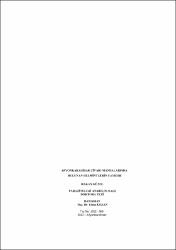Afyonkarahisar Civarı Mandalarında Bulunan Helmintlerin Yayılışı
Citation
Güzel, Hakan. Afyonkarahisar Civarı Mandalarında Bulunan Helmintlerin Yayılışı. Afyonkarahisar: Afyon Kocatepe Üniversitesi, 2012.Abstract
Bu çalışma Mart-2009 ile Şubat-2012 tarihleri arasında Afyonkarahisar civarı mandalarında bulunan helmintlerin yayılışını belirlemek amacıyla manda populasyonunun yoğun olduğu Akçin, Küçükçobanlı, Kadıköy, Köprülü ve Afyon Merkez’de yürütülmüştür. Toplam 517 mandadan dışkı örnekleri alınarak helmintolojik açıdan incelenmiş, 20 mandanın organ muayenesi yapılmış ve helmintolojik açıdan değerlendirilmiştir.
Çalışma süresince dışkı bakısı yapılan mandalarda enfeksiyon oranı % 7.93 olarak tespit edilmiştir. Hastalıktan sorumlu 2 trematod ve 1 nematod olduğu gözlenmiş ancak mix enfeksiyon durumuna rastlanmamıştır. Afyonkarahisar civarı mandalarında trematod enfeksiyonu % 6.67, nematod enfeksiyonu % 1.16 olurken cestod enfeksiyonuna rastlanmamıştır. Dışkı bakısına göre Fasciola sp. % 6.57, Paramphistomatidae spp. % 0.19, Strongylida sp. % 1.16 tespit edilmiştir. Dışkı muayenesi ile strongilid tip yumurta görülen dışkıların kültüründe, Trichostrongylus sp. (% 36.36), Oesophagostomum sp. (% 27.27), Haemonchus sp. (% 18.18), Cooperia sp. (% 9.09) ve Bunostomum sp. (% 9.09) tespit edilmiştir.
Çalışma süresince organ muayenesi yapılan mandalarda ise enfeksiyon oranı % 20 olarak tespit edilmiştir. Hastalıktan sorumlu parazitlerin 2 trematod ile 1 cestod larva formu olduğu görülmüştür. Buna göre Fasciola hepatica % 5, Paramphistomatidae % 5, kist hidatik % 10 olarak tespit edilmiştir. This study was conducted between March-2009 and February-2012 in the Akçin, Küçükçobanlı, Kadıköy and Köprülü villages and central district of Afyon province, all which are characterized by a high population of water buffaloes, with an aim to determine the prevalence of helminth infections in water buffaloes raised in the vicinity of Afyonkarahisar province. Faecal samples, collected from a total of 517 buffaloes, were examined helminthologically. Furthermore, organ examination was performed in 20 water buffaloes for the presence of helminths.
The prevalence of helminth infection in the water buffaloes sampled for faeces throughout the study was determined as 7.93 %. Faecal examination revealed the presence of 2 trematodes and 1 nematode in the infected cases, but mixed helminth infections were not encountered. In water buffaloes raised in the vicinity of Afyonkarahisar province, the prevalence of trematode and nematode infections was ascertained as 6.67 % and 1.16 %, respectively, whilst no cestode infection was detected. Faecal examination revealed the prevalence of Fasciola sp. as 6.57 %, Paramphistomatidae spp. as 0.19 % and Strongylida sp. as 1.16 %. The culture of faeces samples, which were determined to contain strongylid eggs by faecal examination, demonstrated the presence of Trichostrongylus sp. (36.36 %), Oesophagostomum sp. (27.27 %), Haemonchus sp. (18.18 %), Cooperia sp. (9.09 %) and Bunostomum sp. (9.09 %).
On the other hand, the prevalence of helminth infection in the water buffaloes subjected to organ examination was ascertained as 20 %. The parasitic agents involved in the infected cases included 2 trematodes and the larval stage of 1 cestode. Accordingly, it was determined that the prevalence of Fasciola hepatica was 5 %, Paramphistomatidae was 5 %, and cyst hydatid was 10 %.
Collections
- Doktora Tezleri [156]



















